
Editor's Note: This story originally appeared on Live and Invest Overseas.
One of the best things about living in Europe, and one you’ll hear touted by all expats who come to live here, is the fact that everything is so close…
Whether it’s the compact cities that make walking and biking the main mode of transport, the relatively small countries that allow you to explore your new home easily by car or train, or that fact that neighboring countries can be just a quick jaunt away, Europe makes travel easy…
Spain and Portugal
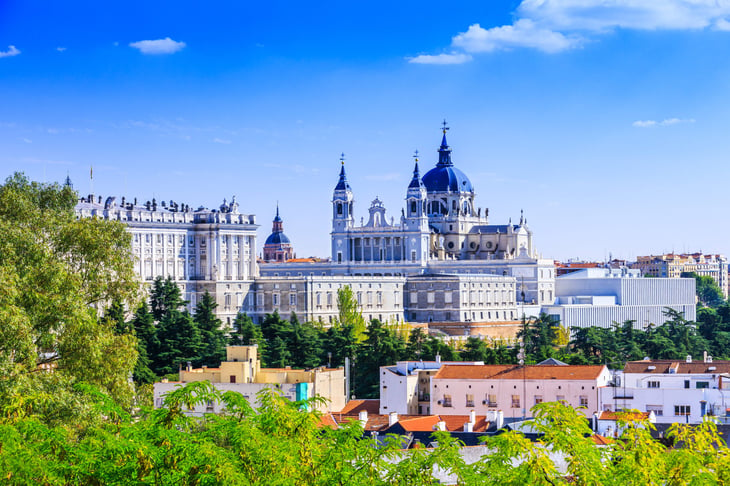
I recently returned from Valencia, Spain, a quick two-hour (very affordable) flight from Paris, which provided a lovely escape from the chilly gray of Northern Europe before settling in for the cold of winter.
My family and I usually head south to snowier climes for the holidays, taking advantage of the Alps, just a few hours away by car or train… I can’t remember the last time we stayed home for Christmas, but this year we’re doing just that.
During the colder months this year, we likewise plan to stick close to home, with weekend trips to nearby chateaux and a few of the picturesque towns of Northern France…
But come April, I can always count on shaking off the chill of early spring with a trip to Portugal.
Two Wonderful Countries

Sometimes I tack on a few extra days to spend in Lisbon or Comporta, and sometimes we make it a road trip from the capital to the Algarve region where we’ve always held these events.
Not sure yet what next year will hold—maybe a visit to the north to expat visit friends Jeff and Joch in their home of Braga, or perhaps to Porto or Sintra, long on my Portugal bucket list.
One thing I can be sure of is sea, sunshine and seafood!
Funny… I recently said the same thing about what I looked forward to in my trip to Spain…
With these two wonderful countries bookending my winter, I’m prompted, once again, to compare them head on…
Portugal’s Pros
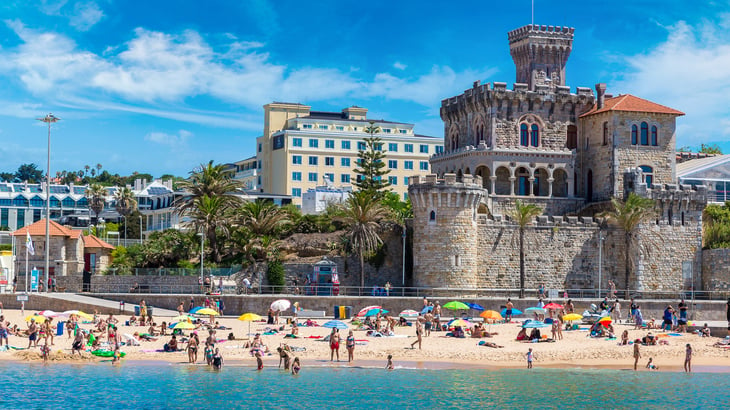
- 12th-best health care in the world (WHO)
- Offers the Portugal Golden Visa program
- Schengen-member country
- Residency is easy to acquire (the D7 option only requires proof of income of about 1,200 euros monthly)
- Roman and Moorish patrimony
- Excellent food and wine, with an emphasis on fresh seafood
- Abundant coastline (1,794 kms, not including islands)
- Excellent beaches (only on the Atlantic)
- 6th highest number of Blue Flag Beaches in the world (394 in 2023)
- Oldest country in the Old World, with history that dates to 1139 B.C.
- English is widely spoken
- Safe, welcoming, politically peaceful country (6th safest in the world)
- Well-positioned for travel around the continent
Spain’s Pros
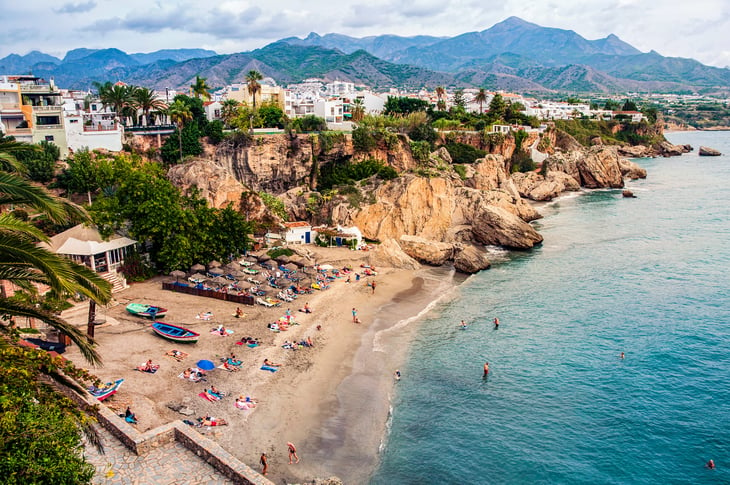
- 7th-best health care in the world (WHO)
- Offers the Spain Golden Visa program
- Schengen-member country
- Residency is easy to acquire (the non-lucrative visa option requires about 2,400 euros monthly)
- Roman and Moorish patrimony
- Excellent food and wine, with an emphasis on fresh seafood
- Abundant coastline (4,964 kms, not including islands)
- Excellent beaches (Atlantic and Mediterranean coastlines)
- Highest number of Blue Flag Beaches in the world (629 in 2023)
- 2nd-largest country in W. Europe, with a varied geography including islands, mountains, rivers, deserts, etc.
- Diverse lifestyle opportunities, from cosmopolitan to vineyard to offshore island
- Spanish is an accessible language
- Well-positioned for travel around the continent
Portugal’s Cons
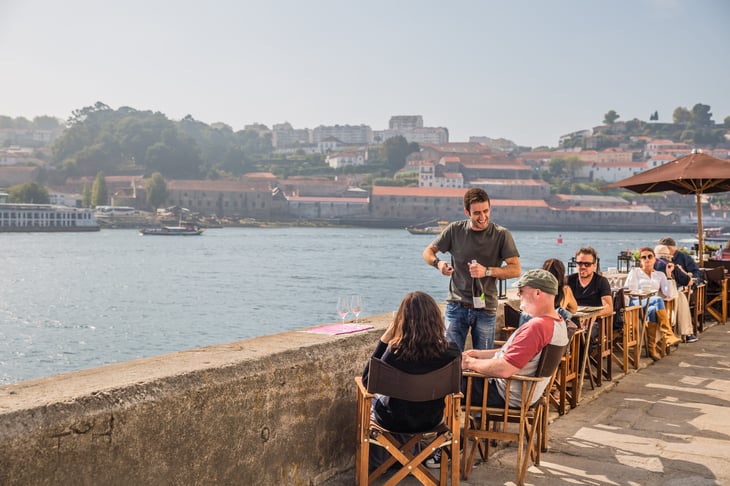
- Old-World bureaucracy
- Restrictions to Golden Visa Program (no more real estate option)
- Bracing Atlantic-water temperatures at Portugal’s beaches—no Mediterranean coastline
- Portuguese is difficult to learn
- Portugal’s health system is over-stretched with long wait times for care
Spain’s Cons

- Old-World bureaucracy
- High taxes with a complicated tax system
- Less politically peaceful: strikes, marches, protests, etc. are common in cities
- Crowded beaches during peak season, over-development in some areas
Now let’s dig into some specifics…
Accessibility

Winner: Spain
This is a tough one, with Spain just nosing ahead of Portugal…
Portugal has but one major international airport in Lisbon, it’s massively over-congested and consistently ranked as one of the worst airports in the world (out of 132 polled by AirHelp).
Spain boasts two, in Madrid and Barcelona respectively. Between the two, you can easily locate yourself in either the east or the west of the country, and from Madrid, you’re about equidistant from the north and south western coasts.
The tradeoff is that Portugal is a much smaller country, so it’s feasible to drive or get a train from Lisbon to wherever it is you’re going, while that’s not always the case in Spain.
Spain compensates with many smaller airports throughout the country, though (some of which even offer direct flights to the U.S. East Coast), so a domestic transfer would only add another hour or so to your travel time.
Cost of Living

Winner: Spain
Both countries have boasted average costs of living about 30% lower than the rest of Western Europe, but that’s quickly changing in Portugal.
Portugal’s most popular havens (notably Lisbon and the Algarve), have seen consistent price increases in the last 10 years or so, in terms of both day-to-day living and real estate.
While it’s still possible to live at a bargain in the north and the interior areas of the country, these are the most popular destinations for foreigners, with either much cooler weather (the north) or no coastline (the interior).
Spain, being a much larger country, offers a lot more gray area in between the overpriced tourist hotspots and the super-affordable lesser-known regions…
Madrid, Barcelona and the Costa del Sol are some of the most expensive parts of the country, but outside of these pockets (and even within them), Spain is a bargain.
All that said, the lifestyles you’re getting in either country represent an amazing value, even at their most expensive, and are still a fraction of the cost of comparable lifestyles in North America.
Real Estate

Winner: Spain
Spain has six times more coastline than Portugal, which makes it a more competitive market, with many more options for the property buyer.
It’s increasingly difficult to find anything affordable in the Algarve within steps of the sand, but in Spain, you can still find attractive coastal property for less than $200,000.
On the city scene, while prices in Porto and Lisbon skyrocketed in the last decade as foreign buyers scrambled for Golden Visas (which is no longer available for property purchase as of October 2023), Madrid and Barcelona are relatively affordable.
Property markets in both the Costa del Sol and the Algarve are hot. A recent spike in foreign buyers has led to a severe lack of inventory in both markets.
With a property purchase of 500,000 euros still making you eligible for Spain’s Golden Visa, which can be split between multiple properties, there’s a serious edge for buying in Spain over Portugal right now.
Climate

It’s A Tie…
What qualifies as perfect weather is subjective, so it’s impossible to pick a winner in this category…
The southern tip of the Iberian Peninsula boasts the best weather in Europe, and the climate in these two regions is very similar. Both get 300-plus days of sunshine a year and minimal precipitation. Summers are dry and hot, and winters are mild and wet in both.
If you want higher temperatures and more sunshine year-round, go to the Costa del Sol. It’s warmer, influenced by the Med instead of the Atlantic. In July-August, the daily mean is over 78°F (26°C) versus the Algarve’s 73°F (23°C).
Winters are proportionately cooler in the Algarve over Spain’s southern coast due to the Atlantic influence, too… This might be a good thing or a bad thing, depending on your preferences.
In the north of both countries, you’ll get more precipitation and much cooler weather year-round.
And in Spain’s interior, you’d be surprised at how varied the year can be, with a full four seasons, even in cities as far south as Granada, for example.
Quality of Life
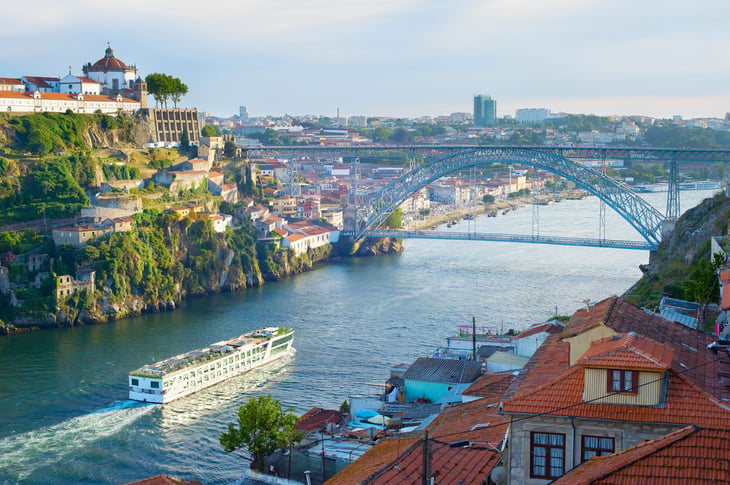
It’s A Tie…
Again, it’s impossible to pick a winner…
Both countries offer stunning coastlines with world-class beaches, welcoming expat communities, golf courses, excellent hospitals, charming historical villages, rural getaways and more…
Both cultures are strongly family-oriented, and in the small towns that dot the hillsides, a simple, traditional village lifestyle dominates.
Both destinations offer laid-back lifestyles—the opportunity to take your foot off the pedal when it comes to the pace of life.
One of the most lauded aspects of life in both countries for expats is the newfound work-life balance and the chance to reevaluate how to simply enjoy day-to-day living.
Ease of Residency
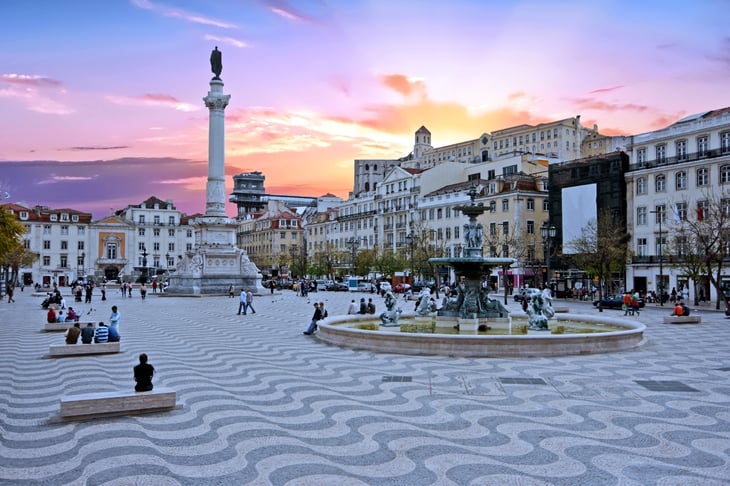
Winner: Portugal
Portugal has long been the easy winner here… It offers the D7 or Passive Income Earner visa, which you can qualify for quickly and easily with about 1,200 euros of monthly income.
It also used to offer a Golden Visa through property purchase of as little as 250,000 euros… then more commonly 500,000… then was limited to only certain, less desirable parts of the country…
With changes to Portugal’s Golden Visa taking effect in October of this year, it’s no longer possible to gain citizenship by property purchase of any kind, the remaining options are limited to venture capital funds, donations to the arts or scientific research, or creation of jobs.
Spain’s equivalent to the basic residency program, the Non-Lucrative Visa, has more onerous requirements, including a higher qualifying amount for income (about 2,400 euros per month).
On the other hand, you can qualify for Spain’s Golden Visa by buying real estate worth 500,000 euros, which can be split between multiple properties.
Still, for most folks, the most common way to stay long-term is through simple residency as opposed to investment for citizenship, making Portugal the clear winner here.
Infrastructure

It’s A Tie…
Infrastructure is about on par in both countries…
In cities, you’ll find excellent public transportation and easy walking or biking terrains.
If you settle on the coast of either country, you will most likely need a car to get around. Public transportation is not well-appointed in coastal areas (like Algarve or the Costa del Sol) but the roads and highways are still well-marked and high-standard.
Likewise, things like electricity, internet, garbage collection, etc., are on par in both places.
Health Care

Winner: Spain
Spain has the seventh-best health care in the world according to the World Health Organization‘s rankings.
Portugal comes in at #12, so it’s not far off of Spain’s lead… However, expats across Portugal complain of long wait times to receive care in the public health care system.
Ease of Settling In

Winner: Portugal
Both the countries have big, well-established expat communities, mostly made up of retirees from the U.K. Both Portugal and Spain boast many of the same attractions and have lots to offer retirees.
That said, English is widely spoken in Portugal. Not so much in Spain…
Language Barrier

Winner: Spain
With so much Latin American influence in the United States, you likely have at least some basic Spanish phrases… which can make it less daunting than starting a language from scratch.
If you want to begin learning before you go, it’s also easy to find Spanish classes in almost any U.S. town.
However, be aware that Castilian (Spain’s Spanish) is quite distinct from Latin American Spanish.
It’s not just a matter of accents… words, phrases, and even commonly used conjugation are very different.
Warm Water

Winner: Spain
If you’re fond of sea swimming, but aren’t a fan of cool Atlantic temperatures, then you may prefer Spain.
Both countries have stunning coasts and beaches, but only Spain has a Mediterranean coastline where water temperatures in the summer range between 76°F and 82°F (24 to 28°C).
You can make lists and on-paper comparisons as much as you’d like, but, frankly, the only way to know if either of these countries is more or less appealing to you than the other is to visit them yourself.
I’ve done my best to compare apples to apples here, but, in the end, these are my personal rankings.
Everything comes down to your own personal preferences and priorities… what makes a winner for me might make a loser for you.





Add a Comment
Our Policy: We welcome relevant and respectful comments in order to foster healthy and informative discussions. All other comments may be removed. Comments with links are automatically held for moderation.